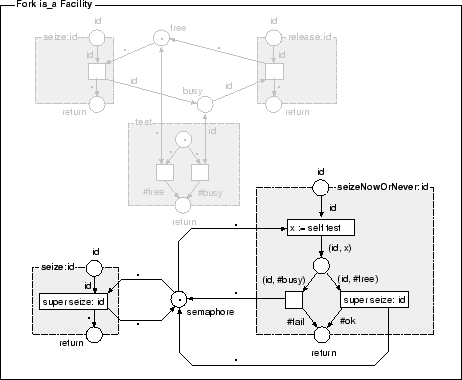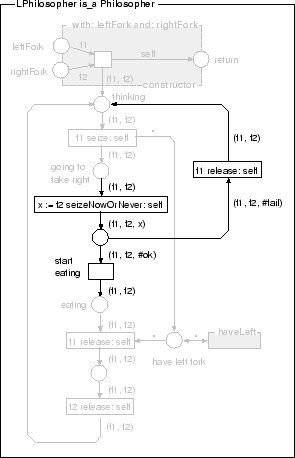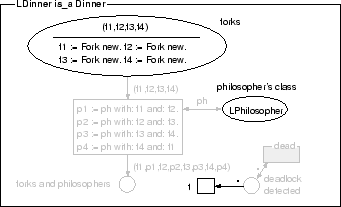This version of dining philosophers (without a possibility of a deadlock) from
[#!Janousek:1994:OOPN!#] demonstrates the inheritance concept in OOPN.
Let us have look at class Facility. Note that examinating state of a Facility ( ![[*]](cross_ref_motif.gif) ) via method test is a bit problematic
because a message sending is not an atomic operation and thus the state can
change before the test finishes. This problem can be solved by means of
synchronous ports. Nevertheless, in order to demonstare other PNtalk features
we use another solution (demonstarion of synchronous ports application will be
done later).
) via method test is a bit problematic
because a message sending is not an atomic operation and thus the state can
change before the test finishes. This problem can be solved by means of
synchronous ports. Nevertheless, in order to demonstare other PNtalk features
we use another solution (demonstarion of synchronous ports application will be
done later).
Class Fork (see fig. ![[*]](cross_ref_motif.gif) ) inherits from Facility and defined method seizeNowOrNever:.
If the facility (fork) is seized, the nethod seizeNowOrNever: does not
wait until it is released. Instead, i immediately finishes and returns
#fail.
) inherits from Facility and defined method seizeNowOrNever:.
If the facility (fork) is seized, the nethod seizeNowOrNever: does not
wait until it is released. Instead, i immediately finishes and returns
#fail.
Original method seize: is modified in order to allow modification of the
state of a facility only in mutual exclusion with method seizeNowOrNever.
New implementation of seize: uses pevious implementaion via super.
3
Class Fork allows us to create a model of dining philosophers
which seize forks sequentially as in previous model, but in a case that a fork
can not be seized, the respective philosopher releases a fork he already owns
and then starts searching for both forks again (see class
LPhilosopher (live philosopher) on fig. ![[*]](cross_ref_motif.gif) .
.
Class LDinner (see fig. ![[*]](cross_ref_motif.gif) ) redefined transition
t (which is inherited from Dinner) in order to
disable its firing because deadlock detection is obsolete in this model.
The transition t have the only input place deadlock
detected which remain empty (this place lost its original meaning).
) redefined transition
t (which is inherited from Dinner) in order to
disable its firing because deadlock detection is obsolete in this model.
The transition t have the only input place deadlock
detected which remain empty (this place lost its original meaning).
Vladimir Janousek
2001-01-15
![[*]](cross_ref_motif.gif) ) via method test is a bit problematic
because a message sending is not an atomic operation and thus the state can
change before the test finishes. This problem can be solved by means of
synchronous ports. Nevertheless, in order to demonstare other PNtalk features
we use another solution (demonstarion of synchronous ports application will be
done later).
) via method test is a bit problematic
because a message sending is not an atomic operation and thus the state can
change before the test finishes. This problem can be solved by means of
synchronous ports. Nevertheless, in order to demonstare other PNtalk features
we use another solution (demonstarion of synchronous ports application will be
done later).


